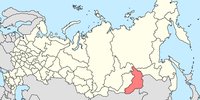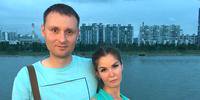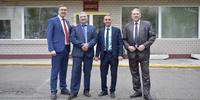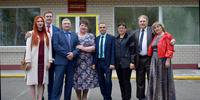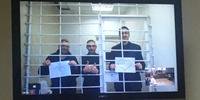Case of Ermolaev and Others in Chita
Filter
- #
While relaxing by the river, next to the tents, Chita believers notice themselves being surveilled: they discover tracking devices and hidden audio recordings.
- #
During the day, officers of the FSB and other bodies conduct searches in 50 houses of believers in cities and towns of the Trans-Baikal Territory, namely: Chita (20 searches), Khilok (4 searches), Krasnokamensk (4 searches), Baley (3 searches) and Petrovsk-Zabaikalsky (2 searches), the villages of Yasnogorsk (6 searches), Amazar (4 searches), Duldurga (2 searches), Verkhnyaya Hila (1 search), Kurort-Darasun (1 search) and Pervomaiskoye (1 search), as well as in the villages of Verkh-Chita (1 search), Zasopka (1 search) and Ilya (1 search). (Information about raids against believers in Karymsky and Shilka has not been confirmed.) At least 10 people were detained for interrogation. 31-year-old Vladimir Ermolaev (married), 47-year-old Sergey Kirilyuk (married), Pavel Mamalimov (married, has a young daughter), 31-year-old Vadim Kutsenko (married) remain in custody.
During a search in the home of another family, the security forces beat the minor Alexander Karpov. Law enforcement officers forcibly knocked him to the floor, put his hands behind his head and beat him in front of his mother and younger sister. The young man is forced to "crawl" into the living room, where law enforcement officers read out a search warrant. The search lasts 12 hours. (Later, the lawyer in Alexander's interests filed a complaint with the investigation department about the actions of the security forces. The medical expert records the traces of beatings, and a specialist goes to inspect the house, who removes tights with traces of Alexander's blood.)
Among others, the search takes place in the house of Olga Polyakova, a 62-year-old resident of Khilka, a disabled person of group III. Although she has difficulty moving, she is taken away for interrogation after the search. In the same city, security forces search the home of the Maltsev family. Both spouses are on disability and are raising a minor daughter. During the search, an ambulance is called for the spouses. Despite this, the head of the family, Vadim, is taken away for interrogation.
The Vasilyev spouses, who live in Kurort-Darasun with four minor children, were invaded by law enforcement officers early in the morning. During the search, the head of the family, a disabled person of group III, felt unwell, but he was still taken away for interrogation.
The Investigative Committee reports that more than 30 investigative and operational groups were formed before the raids, which simultaneously worked in Chita and the districts of the Trans-Baikal Territory.
31-year-old Vadim Kutsenko is handcuffed behind his back, his eyes are closed and he is subjected to beatings, strangulation and electric shocks to the lower leg and abdomen in an official car, demanding a confession. During the torture, Vadim Kutsenko refuses to admit guilt or give false testimony against his fellow believers. A company car stops in the forest behind the SibVO stadium. They take off his hat from his eyes and force him to get out of the car and beat him on the legs. After that, he is taken to the investigator, where he immediately declares the torture applied to him.
- #
The Ingodinsky District Court of Chita sends Vladimir Ermolaev under house arrest until March 20, 2020. The arrest of Pavel Mamalimov, Sergey Kirilyuk and Vadim Kutsenko was extended for another 72 hours, until February 15 inclusive.
- #
Vadim Kutsenko sends an appeal to the head of the Investigative Department of the Investigative Committee of the Russian Federation for the Trans-Baikal Territory, Y. S. Rusanov, with a request to initiate a criminal case on the fact of torture and bring the perpetrators to justice.
- #
After 5 days of detention, without charge, believers Vadim Kutsenko, Pavel Mamalimov and Sergey Kirilyuk were released. They remain suspects. The believers were released because the Investigative Committee withdrew the petition for them to be chosen as a measure of restraint. Vladimir Yermolaev remains under house arrest.
- #
It becomes known that the number of believers in Chita who are prosecuted for their faith under Part 1 of Article 282 of the Criminal Code of the Russian Federation is nine. Among them are the accused: Vladimir Ermolaev; suspects: Sergey Kirilyuk, Vadim Kutsenko, Alexei Loskutov, Vadim Maltsev, Pavel Mamalimov, Igor Mamalimov, Alexander Putintsev and Alexander Trofimov. It is known that minor children are raised by at least four of these peaceful believers (Kirilyuk, Maltsev, I. Mamalimov, Trofimov).
- #
- #
In a joint statement , 27 European states that are members of the European Union (EU), as well as 6 other non-EU countries, at a meeting of the Permanent Council of the Organization for Security and Cooperation in Europe (OSCE), call for an investigation into the report that Vadim Kutsenko, before he was detained, was tortured. Law enforcement officers repeatedly beat and choked him, as well as beat him with electric shocks, demanding information about other Jehovah's Witnesses.
- #
Employees of the Federal Penitentiary Service take Vladimir Yermolaev to the investigation department. After 50 days under house arrest, the investigator changes his preventive measure to a written undertaking not to leave the place.
- #
The Investigative Committee refuses to satisfy the appeal, arguing that the check did not confirm the fact of torture. The Investigative Committee confined itself to taking explanations from the operatives, who were allegedly forced to use force in response to Kutsenko's resistance.
The Investigative Committee refuses to open a criminal case on torture against Kutsenko, arguing that the check did not confirm the facts of the use of violence. At the same time, the investigative committee confines itself to taking explanations from the operatives, who said that they used force in response to Kutsenko's resistance.
- #
An employee of the Investigative Committee of the Russian Federation is interviewing Alexander Karpov, who was beaten by police during a raid on February 10, 2020. The investigator also photographs the crime scene.
- #
- #
It becomes known that the investigation considers Vadim Maltsev not as a suspect, but as a witness in a criminal case for faith in Chita. Thus, the total number of believers known to be declared suspects and accused in a criminal case is 7 people. Kutsenko sends a complaint to the Chita Garrison Military Court: "The inspection is incomplete and one-sided, which is why the decision to refuse to initiate a criminal case was made prematurely and is illegal and unreasonable. Investigator, contrary to the requirements of Part 2. Article 21 of the Code of Criminal Procedure of the Russian Federation, actions aimed at properly verifying the arguments of the application and capable of refuting or confirming the information contained therein, including those specified in the text of the application, have not been carried out. Kutsenko draws attention to the contradictions in the testimonies of the officers who tortured him, and the selective approach to the evaluation of evidence. Asks to recognize the refusal to initiate a criminal case as illegal.
- #
During the hearing in the Chita Garrison Military Court, Kutsenko learns that the head of the investigative body canceled the decision to refuse to initiate a criminal case on the torture allegation. The cancellation of the ruling means that the pre-investigation check on the allegations of torture continues.
- #
The investigator begins interrogations of the defendants in the case of Vladimir Ermolaev. The first to be interviewed were Vadim Kutsenko, Igor Mamalimov and Alexander Putintsev. Alexei Loskutov was also issued a summons. During interrogations, suspects are asked to provide handwriting and voice samples. Believers are considering the possibility of refusing to provide data on the basis of Article 51 of the Constitution of the Russian Federation.
- #
It becomes known that a 60-year-old local resident Georgy Senotrusov was involved as a suspect.
- #
V. A. Zhuravlev, an investigator of the second department for the investigation of especially important cases of the Investigative Directorate of the Investigative Committee of the Russian Federation for the Trans-Baikal Territory, from the criminal case of Ermolaev and others in Chita, identifies materials against Vadim Kutsenko, Aleksey Loskutov, Pavel Mamalimov and at least 12 other believers to verify their involvement in the commission of other crimes: participation in the activities of a religious association banned by the court, involvement of other persons in it and financing of extremist activities.
- #
Zhuravlev terminates the criminal prosecution of Vadim Kutsenko, Aleksey Loskutov, Pavel Mamalimov and another believer due to the absence of corpus delicti in their actions under Part 1 of Article 282.2 of the Criminal Code of the Russian Federation (organizing the activities of a religious association banned by the court). However, there is still a possibility that believers may be prosecuted for participating in religious activities.
- #
It becomes known that the investigator sent a criminal case against four Jehovah's Witnesses to the prosecutor's office for signature: Vladimir Yermolaev, Sergey Kirilyuk, Igor Mamalimov, and Alexander Putintsev. They are charged with organizing the activities of a banned organization (Part 1 of Article 282.2 of the Criminal Code of the Russian Federation).
- #
Deputy Prosecutor of the Trans-Baikal Territory T. F. Magomedov approves the indictment against Putintsev, Ermolaev, Kirilyuk and Mamalimov.
- #
The case goes to the Central District Court of Chita.
- #
The judge warns that listeners will not be allowed into the hall because of covid. The defendants refuse the appointed lawyers, but the court is not satisfied. The Public Prosecutor shall announce the indictment. The defendants express their attitude to the prosecution. For example, Alexander Putintsev, expressing his attitude to the charges, says: "The main question that arises in my mind: why did I, a believer, need to organize the activities of a legal entity? What spiritual needs as a believer could I not satisfy without the LRO or its structural subdivisions?" He has a legal, constitutional right to worship God without forming a legal entity, and the charges against him and his friends are illegal.
- #
Alexander Putintsev, in the interests of better protection, asks for the possibility of visual contact with the interrogated witnesses, but the judge, without listening to the opinion of the parties, refuses, adding: "Comfortable conditions can only be at the resort, and we are in the courtroom."
Witness Aleksandr Dzhupina from the Department of Justice explains that the department has not received any negative information regarding Jehovah's Witnesses, and there have been no violations related to extremism. The Charter of the liquidated LRO did not say anything about elders and the council of elders, there was only a "chairman". Witness Ilya Barinov, a religious scholar, explains that Jehovah's Witnesses did not call for violence. In the fact that they refuse to serve in the army in favor of the ACS, he does not see a negative attitude towards the authorities. Other religions also refuse the army.
- #
Due to the illness of one of the defendants, the hearing is adjourned.
- #
During the trial, the prosecution witness, Doctor of Philosophy, Professor of the Department of Philosophy of the Trans-Baikal State University Artyom Zhukov is interrogated. Since 2002, he has been involved in the work of the Council on Religious Associations under the Administration of the Chita Region and the Governor of the Trans-Baikal Territory. He believes that the activities of the Chita group are the canonical activities of Jehovah's Witnesses throughout the world.
"The life of Jehovah's Witnesses is one of the most dramatic, in Transbaikalia, I mean, and the most dramatic and holistic moments. The existence of the organization itself, I think, is still underestimated at the world level, and their feat will still be appreciated. And, of course, the persecution that they are experiencing today will also be assessed in due time, and in due time everything will be restored to their rights. Because there are no other options in world history. But at the moment, real people are suffering." (During the Soviet years, Jehovah's Witnesses were repressed for their faith, exiled, and sent to camps in Siberia, Transbaikalia, and the Far East.)
Regarding the position of Jehovah's Witnesses regarding the rejection of blood donation, Zhukov notes: "If a person accepts this as his decision, then I do not think that this contradicts the basic principles of the Constitution." He confirms that they do not refuse medical treatment: "They are normal people, and when medical intervention is necessary, it is quite obvious."
- #
16 people come to the hearing. The first three volumes of the case materials, which contain telephone conversations of Alexander Putintsev and transcripts of his conversations via video link, are examined.
The prosecutor does not read the transcripts in full, but only lists their titles.
- #
12 people are present at the hearing.
The court examines the video materials of the case as evidence for the prosecution. At the same time, the judge violates the rights of the defendant Vladimir Ermolaev, not giving him the opportunity to comment on the viewing of one of the videos. Also, the judge does not give the opportunity to watch the video to the end.
- #
8 people come to the next hearing. The study of material evidence seized during the search continues. Among others, a printed article is read out: "How not to hurt each other with words?"
At the next meetings, they will continue to familiarize themselves with the case materials.
- #
To support the believers, 15 people come to the court session. During the hearing, the prosecutor reads out the record of the examination of material evidence, including the contents of the notebook with notes of culinary recipes, which, in the opinion of the prosecutor, are information of interest to the criminal case.
- #
The information seized from Igor Mamalimov's phones is being investigated. The prosecutor reads out one of the messages found on the phone in full: "Igor, thank you for your advice, they are so useful, loving and invaluable." Sergey Kirilyuk's petition for full acquaintance with the content of some open-source videos presented to the court as prosecution evidence was also granted.
- #
Igor Mamalimov was hospitalized due to surgery and is not present at the court hearing. The prosecutor asks the court to make a request to the hospital and then choose a measure of restraint for the believer in the form of imprisonment in a pre-trial detention center. He believes that Mamalimov is delaying the process. The court also receives a response from the hospital about the state of health of Sergey Kirilyuk, which says that he also cannot attend the court. In this regard, the prosecutor asks the court to separate the case of Kirilyuk into a separate proceeding. But the court decides to first summon his attending physician for questioning.
- #
The court does not satisfy the prosecutor's request to separate the case of Sergey Kirilyuk into a separate proceeding.
During the hearing, three videos from open sources presented to the court as evidence for the prosecution are played, but another 9 files are refused to be viewed for technical reasons.
- #
The prosecutor finishes providing evidence from the prosecution.
Judge Marina Kuklina announces that the court is moving to the stage of interrogation of the defendants, although according to the Code of Criminal Procedure, Part 2 of Article 274 "... After examining the evidence presented by the prosecution, the evidence presented by the defense is examined.
- #
Four defendants file petitions with the court with a request to exercise their right to provide evidence by the defense, and then proceed to the interrogation of the defendants.
- #
The hearing in the case of Vladimir Yermolayev and three other believers continues. The defense provides its evidence.
Vladimir Yermolaev asks the court to examine the evidence of the prosecution previously attached to the materials of the criminal case as evidence of the defense. However, the court refuses to examine these materials, explaining that it was necessary to declare when the prosecutor examined them, allegedly this is the procedure. (At the same time, on June 25, 2021, the court denied Yermolaev the opportunity to comment on the prosecution's evidence at the stage of examination.) Yermolaev is also denied pages from his passport. These pages show that on a number of dates that are imputed to him, he was absent from the country, and therefore could not have committed these offenses.
- #
About 20 people come to the courthouse to support the believers.
The last of the defendants gives his testimony to the court.
The judge refuses to satisfy the defense's petitions, including the study of the book "Tetragrammaton", the announcement of the decision of the Supreme Court of 20.04.2017 and information about the teachings of Jehovah's Witnesses, about the presence of Yermolaev's wife at the announcement of the verdict. Some of these requests had previously been partially granted by the judge.
- #
The debate of the parties is taking place. The prosecutor requests 7 years of imprisonment in a penal colony for Vladimir Yermolayev and Aleksandr Putintsev, and 6 years of suspended sentence for Sergey Kirilyuk and Igor Mamalimov.
At the next hearing, the debate will continue, the defendants will make their last speech. The date of the verdict is expected to be announced.
- #
The hearing begins with remarks, which the parties have the right to make in accordance with Article 337 of the Code of Criminal Procedure of the Russian Federation.
Alexander Putintsev, Igor Mamalimov and Sergey Kirilyuk address the court with the last word. The last word of Vladimir Yermolaev is postponed to the next meeting.
The last word of the defendant Igor Mamalimov in Chita The last word of the defendant Sergey Kirilyuk in Chita (published with abbreviations) The last word of the defendant Alexander Putintsev in Chita - #
The last word of the defendant Vladimir Ermolaev in Chita - #
The court found the believers guilty and sentenced Vladimir Yermolaev, Aleksandr Putintsev and Igor Mamalimov to 6.5 years of actual imprisonment, and Sergey Kirilyuk to 6 years of suspended imprisonment.
- #
It becomes known that the believers sentenced to a real term were taken to pre-trial detention center No. 1 in the Trans-Baikal Territory, located in Chita.
- #
- #
Vladimir Yermolaev is taken to Correctional Colony No. 3 in Chita. He is quarantined. Another Jehovah's Witness, Roman Baranovsky, is serving time in the same colony for his faith.
Igor Mamalimov and Aleksandr Putintsev are in the process of being moved to places where they are serving their sentences. It is known that Mamalimov will serve his sentence in Abakan (Khakassia), and Putintsev in the Altai Territory.
- #
Igor Mamalimov was taken to correctional colony No. 35 in the city of Abakan to serve his sentence. He is in quarantine. He can write letters.
Aleksandr Putintsev arrives at Colony No. 5 in Rubtsovsk, where another Jehovah's Witness, Yuriy Savelyev, is already serving a sentence for his faith. In the admission department of the prison, psychological pressure is exerted on him - about twenty employees of the colony force him to write a statement of cooperation with the administration. Alexander refuses. He is placed in quarantine for two weeks.
- #
Putintsev is placed in a punishment cell, where he spends a total of 23 days [according to Article 118 of the Penal Code of the Russian Federation, the maximum period of detention in a punishment cell is 15 days - Ed.]. He received the first penalty for the fact that "the button was not fastened", the second - for the fact that "he did not hold his hand from behind as it should." In this regard, Alexander is recognized as a "malicious violator of the regime."
The believer receives many letters from fellow believers who support him. He especially likes drawings with biblical scenes.
- #
After the punishment cell, Aleksandr Putintsev is transferred to strict conditions of detention (SUS). The representative of the administration explains this by the fact that Alexander is a Jehovah's Witness, and "due to the gravity of the article, he was put on the preventive record as prone to the spread of extremist ideology." He is being held in the SUS along with six other prisoners. The chamber is warm and dry.
- #
A lawyer visits Igor Mamalimov in the penal colony.
The believer is concerned about long-standing heart problems. In the colony, he has access to qualified medical care, diagnostic equipment and medical personnel. Igor's wife prepares the necessary medical documents.
Igor does not lose heart. He has a Bible from which he draws comforting thoughts. The letters have not yet been handed over to him, explaining this by the fact that the head of the detachment is on vacation.
He has good relations with his cellmates and the administration. Igor works - he is engaged in the decoration of premises. He is happy about this, because thanks to busyness, time flies faster. In addition to working on weekdays, the believer works half a day on weekends.
- #
Alexander Putintsev is transferred from IK-5 to the regional tuberculosis hospital in Barnaul.
- #
The lawyer visits Aleksandr Putintsev in the hospital. The believer says that the conditions of his detention and food are good. Patients can move freely around the 4-storey building, go out into the walking courtyard.
Alexander has diabetes mellitus, so he was registered with an endocrinologist and provided with all the necessary medicines. The man's health is restored: in six months he lost weight, losing weight by 16 kilograms, and therefore his blood pressure stabilized. The believer maintains good physical shape: every day he does exercises, squats and push-ups.
Putintsev has a Bible. At times he plays chess with prisoners. Recently, he said, positive emotions increased: prisoners gave him a purple pencil, thereby reminding him of the courage of Jehovah's Witnesses in Nazi Germany.
Alexander says that during the transfer, he unexpectedly met Andrei Vlasov on the train. The believers were very happy to get acquainted, and fellow travelers were surprised at such warm communication between people who met for the first time.
- #
It becomes known that after 1.5 months of stay in the hospital, Alexander Putintsev returned to IK-5 of Rubtsovsk for further serving his sentence.
- #
- #
Igor Mamalimov is transferred to the Medical Correctional Institution No. 34 of the Federal Penitentiary Service of Russia in the Republic of Khakassia. He can write letters.
- #
Wife and son on a date with Aleksandr Putintsev in the colony.

- #
Aleksandr Putintsev is still in strict conditions of detention in the colony. He, his wife and son applied to be transferred to a colony closer to home. All applications were rejected in writing. The believer's elderly mother has a chronic illness and is unable to cover a distance of 3,500 kilometers to visit her son.
Due to the severe form of insulin-dependent diabetes mellitus, Aleksandr had other aggravated diseases: hypertension, deforming arthrosis, retinopathy and polyneuropathy, because of which he could not even walk for some time. A neurologist prescribed him a cane.
- #
Igor Mamalimov was transferred to serve his sentence in a medical correctional institution. He suffers from hypertension, so he periodically seeks medical help. A believer works in a furniture shop, has two incentives, one cash prize. He was trained as a cook.
In March, Igor is scheduled to have a long meeting with his wife. She does not have the financial opportunity to come on short visits, since she lives in the Trans-Baikal Territory, which is more than 2500 km from the colony.
- #
The conditions of detention of Aleksandr Putintsev remain strict, despite his deteriorating health due to diabetes. Nevertheless, the believer is not discouraged - other prisoners are surprised at the calmness that Alexander experiences despite the difficulties. The support of his family and friends helps him maintain a positive attitude. The man is happy to receive letters and parcels from them. He can call his family; In April, he had a long meeting with his wife.
- #
It becomes known that criminal prosecution against Vadim Kutsenko, who was dropped in January 2021 under Part 1 of Article 282.2 of the Criminal Code of the Russian Federation, is being resumed . It is included in the Rosfinmonitoring list.
- #
Vladimir Yermolaev works in a carpentry shop. Despite frequent colds, he remains optimistic - he is happy to see his wife, especially on long dates. The believer has a Bible, he is grateful for regular letters of support.
- #
Igor Mamalimov continues to receive treatment, but an exact diagnosis has not yet been made. The medical staff tries to maintain his blood pressure within normal limits.
The believer is kept in a unit with 60 people, who respect him. Several times, when the prisoners could not watch TV or listen to music due to power outages, Igor brightened up their free time by playing the accordion.
Igor finds support and encouragement in the Bible. He is also grateful for the letters he receives regularly. Recently, he had a visit from his wife and children.
- #
Aleksandr Putintsev has been placed under general detention conditions. The barracks have heating, but no hot water. Prisoners can use the banya twice a week. For a while, the believer worked in the sewing workshop. He has developed friendly relations with other inmates and staff in the penal colony.
Aleksandr receives many letters of support. He has a Bible. In his free time, he writes poems. This helps him to stay cheerful. Previously, he had surgery around his shoulder. Putintsev is worried about his elderly mother's health and his wife, who is caring for her.
